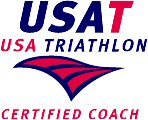Triathlon Overtraining
by Kevin Koskella, www.triswimcoach.com
Most coaches will subscribe to the "no pain, no gain" philosophy. More is better, faster is better, tighter intervals are better, etc. This is not the Tri Swim Coach method!
Especially with the sport of Triathlon, it is easy to overtrain your body. Most of us belong to groups, whether it's a masters swim team, bike club, or running group, and there will always be pressure to keep up. It may be underlying or it may be outright, but no doubt, that pressure to go faster is always there.
Overtraining can be worse than undertraining.
Some symptoms of overtraining include:
- Fatigue
- Problems with sleep
- Easily stressed out
- Getting sick often (weakened immune system)
- Depression
If you have any of these signs you may be overtraining. Here are a few tips on how to avoid this and recover:
- GO AT YOUR OWN PACE!!! This is difficult for many triathletes that train with groups. They are constantly pushing themselves to keep up and go faster. Doing this often will hurt your training. Keep in mind that you want to train mostly at an aerobic pace. If you can talk to the person running next to you, you are probably training aerobically.
- Don't always listen to your coach. Ok, I know this sounds strange. But let's say you're swimming with a masters group once a week. The group likely consists of fitness swimmers, competitive swimmers, and triathletes- all with different goals and different reasons to train. The coach may be pushing the group to go fast on every set that day, but this may not be the right thing for you. Make sure to not get caught up with the group goals or the coach's goals for the group, and swim at a pace that works for you.
- Do yoga. If you are training hard, do yoga. In fact even if you are not overtrained, yoga is an essential part of a triathlon training routine. Once a week is all you need. This will make you more flexible as well as clear your mind and make you stronger mentally as well.
- Wear a heart rate monitor. This is tougher to do in the pool, but for the bike and run, this will save your body! Keep most training sessions at or below your aerobic heart rate (I use 180-your age + :05).
- Take a day off. It is tempting to train daily when we have to contend with 3 different activities. However, this will hurt you in the long run. Include 1 day a week where you just do some stretching, or go for a walk, anything but a workout. Some triathletes even take 2 days a week off, which is totally acceptable.
Following these tips will allow you to enjoy the sport, have a longer career, avoid injuries, and overall be happier!
About the Author
Kevin coaches masters and triathlete swimmers in San Diego, CA. He operates the website www.TriSwimCoach.com, a resource for beginning through intermediate level triathletes looking for help with swimming. The site features a free email newsletter offering tips and articles on triathlon swimming. Kevin has also written an electronic book titled "The Complete Guide to Triathlon Swimming" which is sold on his website in downloadable form.
3-Fitness Triathlon Training | Coach Ken's Triathlon Training at the RecPlex








